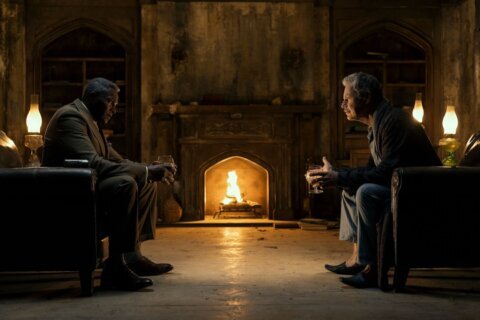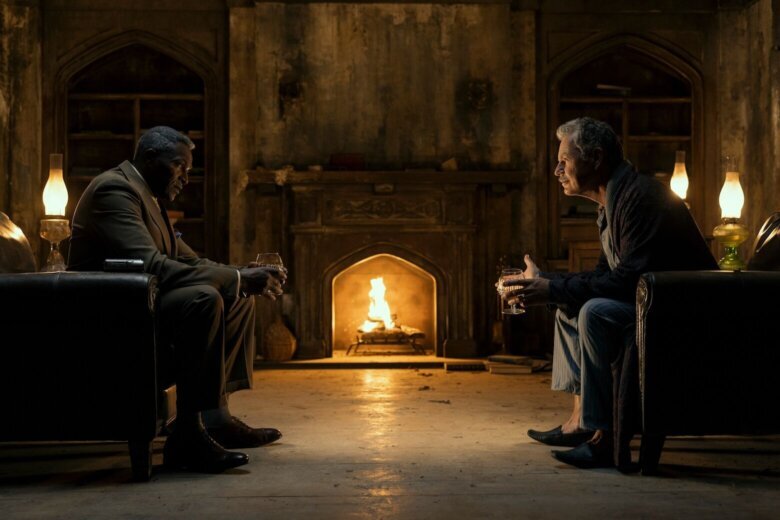Filmmaker Mike Flanagan is the best horror auteur going right now on television — and it’s not even close.

After creepy flicks like “Oculus” (2013), “Gerald’s Game” (2017) and “Doctor Sleep” (2019), the Towson University alum has created such instant-classic horror series as “The Haunting of Hill House” (2018), “The Haunting of Bly Manor” (2019) and “Midnight Mass” (2021), all starring his wife Kate Siegel.
This Thursday, just in time for Halloween, Netflix drops all eight episodes of his freaky new miniseries “The Fall of the House of Usher,” based on the work of Edgar Allan Poe that previously inspired Jean Epstein’s 1928 silent French film and Roger Corman’s 1960 classic starring Vincent Price, the first of Corman’s eight Poe adaptations.
Not only does it delight in the gothic horror genre, it’s also a slick, modern-day dynasty drama like “Succession,” except imagine a supernatural force hunting the heirs to kill them. Roman, Kendall and Shiv wouldn’t last one night against the demonic Verna, deliciously played by Carla Gugino as a mysterious figure who can shape shift into different forms, creatures and appearances as an omnipresent entity stalking the central family, the Ushers.
The opening funeral scene is a bit jarring, hitting us with a montage of rapid-fire images of grisly news clips over the children’s coffins as the sinister Verna smiles from the rear of the sanctuary. I urge you to stick with it as the narrative hits its stride very quickly as the aging patriarch Roderick Usher (Bruce Greenwood) sits down for a fireside chat with U.S. Assistant Attorney C. Auguste Dupin (Carl Lumbly) in what becomes poetic narration.
Such an elaborate framing device is necessary to guide us through a massive undertaking by Flanagan. Rather than simply adapt Poe’s 1839 story “The Fall of the House of Usher,” Flanagan also bases each episode on a different spooky Poe story, which focuses each chapter by centering it around the impending doom of one of the characters.
Episode 1 (“A Midnight Dreary”) introduces Roderick and twin sister Madeline (Mary McDonnell) as king and queen of the pharmaceutical company Fortunato, selling a highly-addictive painkiller like the Sacklers’ OxyContin. Lincoln Russo and Kate Whiddington play them as kids, while Graham Verchere and Lulu Wilson play them as teens, orphaned by a religious mom who refuses to take medicine, her pain haunting them beyond the grave.
Episode 2 (“The Masque of Red Death”) follows Roderick’s youngest illegitimate son Prospero “Perry” Usher (Sauriyan Sapkota), who desperately tries to prove his worth by launching a kinky party company. When his father and aunt turn down his pitch, he goes it alone for a covert masquerade orgy with one of the most disturbing climaxes in TV history. Trust me, it will be burned into your brain like an acid trip you wish you could forget.
Episode 3 (“Murder in the Rue Morgue”) follows illegitimate daughter Camille L’Espanaye (Kate Siegel), who starts the episode as a cocky PR spin doctor but by the end gets her grisly comeuppance. While Perry’s death happened at a venue of his own creation, Camille’s demise oddly happens on a different sibling’s turf. I wish it were more like David Fincher’s “Se7en” (1995) where the setting matched the sin (kitchen for “gluttony,” bed for “sloth,” etc.).
Episode 4 (“The Black Cat”) follows the cat-scratch fever of illegitimate son Leo Usher (Rahul Kohli), who loses the cat of his partner Julius (Daniel Jun) and finds a replica like Jinxy in “Meet the Parents” (2000). It starts innocently with their pet leaving dead rodents, creating “theater of the mind” like Jacques Tourneur’s symbolic “Cat People” (1942) before shifting to sheer in-your-face terror like the zombified cat Church in “Pet Sematary” (1989).
Episode 5 (“The Tell-Tale Heart”) follows illegitimate daughter Victorine LaFourcade (T’Nia Miller), a likable heir whose scientific ambition costs her. Flashbacks also show Roderick and Madeline (played as young adults by Zach Gilford and Willa Fitzgerald) plotting revenge on their oppressive boss. “Once we do this next part, there is no going back,” they say, foreshadowing another such moment with a proverbial “deal with the devil” at the bar.
Episode 6 (“Goldbug”) follows the eldest daughter Tamerlane Usher (Samantha Sloyan), whose intimacy issues have made her a voyeuristic insomniac who should instead look in the mirror. Her failed tech launch speech recalls the finale of Apple TV’s “Severance” (2022), while the apartment climax evokes the mirrors of Orson Welles’ “The Lady from Shanghai” (1947) but with the neon-green light of “Vertigo” (1958) for symbolic shattered reflections.
Episode 7 (“The Pit and the Pendulum”) pays off a disturbing subplot where the eldest son Frederick Usher (Henry Thomas) tortures his comatose ex-wife for alleged infidelity, an obsession that pits him against a pendulum. If you like seeing this dark side of Elliott of “E.T.,” you’ll love the sinister side of Luke Skywalker as Mark Hamill plays Arthur Pym, the family’s Tom Hagen-style lawyer/fixer who has seen it all traveling the globe on expeditions.
It all builds to Episode 8 (“The Raven”) as Verna forces the patriarch Roderick to look out the window of his skyscraper (echoes of Trump Tower include dialogue about being able to shoot someone on Fifth Avenue). As he watches the shadows of millions of opioid-overdose victims falling from the sky like rain, it recalls Jacob Marley showing Ebenezer Scrooge the ghosts of spirits wailing in the London streets in the British “Scrooge” (1951).
Just like that, this Poe miniseries has something important to say about the Dickensian inequalities in our society and the legacy that we each leave behind. Do you want to be known for helping other people? Or will your legacy be one of selfish greed, death and destruction? In the end, grass grows over all of our tombstones, regardless of class, so what do you want to leave behind on this earth? Few Halloween fright fests give us so much to ponder.
Flanagan, you’ve done it again. Poe would be proud.









